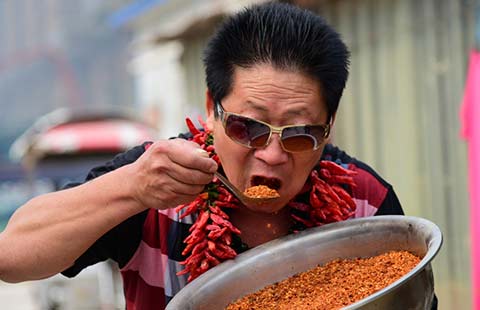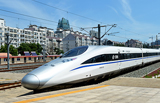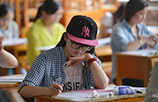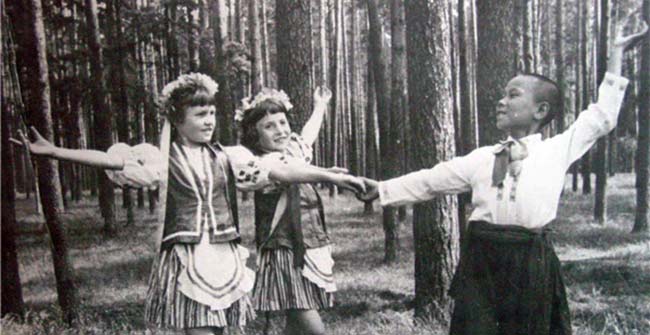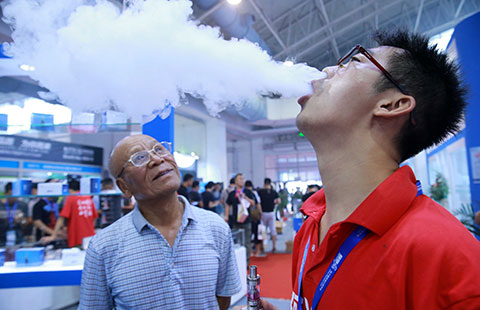Exam time raises hard questions
By He Na (China Daily) Updated: 2012-07-09 08:14"There's a huge profit chain behind gaokao champions. Nowadays, a student's grade is not only related to their own interests, but also becomes a means of justification for teachers, schools and local government leaders. Even business people are keen to take advantage of the reflected glory to promote their products," said Chu.
"When I was in high school, my parents were keen on buying me healthcare products promoted by gaokao champions. They spent a lot of money," said Qian Huizi, an English teacher at a private school in Beijing. "However, even though I had the lot, my grades were still only good enough to gain entrance to an unremarkable university." Qian urged students and parents who dream of champion status to "Please wake up as soon as possible."
However, the hero worship continues unabated. A top high school in Beijing affiliated to Renmin University of China recently denied that it had posted photos of this year's gaokao champions, who both attended the school, along a campus road to encourage others to study harder. The pictures sparked an online debate after a snapshot showed a student bowing in front of them.
Some observers believe that the exam, for which students prepare for three years, is less a test of intellectual ability and more about having a good memory and the regurgitation of facts learned by rote. "Maybe my conclusion is a little extreme, but in my opinion, the announcement that someone is a champion today lays the foundation that tomorrow he or she will be average. That's because the gaokao is just a test that stands for a part of a person's past and future. There is no consistent evidence to indicate a direct connection with future success," said Wang Xuming, a former spokesman for the Ministry of Education.
Guo Fang, a researcher at the Chinese Academy of Social Sciences and Beijing's arts' gaokao champion in 1977, agreed. He said that over the short term the champions are rewarded, but in the long run the success, and attendant lionization, can disturb the normal process of development. "Overwhelmed by praise, people can easily become conceited and complacent. They stand a greater chance of failing to achieve their future goals," he said.
What's more, this sort of hero worship fundamentally strengthens class-consciousness among the young and serves to exacerbate inequality in the distribution of educational resources. It sends the wrong message and implies that education is simply a route to a good job and riches, rather than something helpful to society, said Chu Zhaohui.
The root of the problem
According to Xiong, people's enthusiasm for hero worship is a product of the exam system itself. "As long as the system doesn't change, it will be hard to change people's attitudes toward the champions," he said.
For Xiong, the grades, rankings and champions are simply the product of the gaokao admission system, which only treats the symptoms and not the cause of the hysteria surrounding the high fliers. He urged that the system should be reformed in a way that fundamentally promotes education as a means of enhancing each student's overall potential and not just their ability to recycle reams of often irrelevant information.
At present, the exam is considered the fairest and most scientific way of identifying talent, and has been seen in this light since the reform and opening-up policy of the late 1970s. "However, the negative impact is that it limits training across a whole range of skills and hampers the development of quality-oriented education. That fact should not be underestimated," said Wang Xuming. "We need to diversify the methods by which we identify talent to weaken the gaokao's impact on people's destinies. Society should take responsibility for stopping the speculation over the identity of the latest champion," said Wang.
Chu Zhaohui said a person's innate level of intelligence, their ability to absorb and implement knowledge and their personal interests are much more important influences on their development than exam grades. Society should take a more rational view too, because a candidate's future success and happiness cannot be determined simply by their gaokao score.
Contrast this with the experience of students in the United States, where success in the Scholastic Assessment Test is no guarantee of a place at a prestigious college. "The SAT only accounts for around 25 percent of the recruitment criteria and colleges often have their own methods of evaluating candidates, which are not based primarily on exam results," said Xiong Bingqi.
He wants to see educational reform that takes other countries' experiences into account and does away with the score-oriented method, allowing students to be judged by a number of different criteria.
"We should establish a wide-ranging evaluation system by which we can gradually transfer the rights currently held by the authorities to professional organizations, universities and students," he said. China's education system is aimed at benefiting the nation as a whole, but often fails to benefit the students themselves because they lack intellectual rigor and the ability to work things out for themselves.
Contact the writer at hena@chinadaily.com.cn
Zhang Yuchen contributed to this story.
- Premier praises innovators
- Wide support seen for nationwide smoking ban
- How the 'smart age' could revolutionize old age
- Park to be built on Tianjin blast site
- Airports to help fuel traffic integration
- Experts call for more private capital
- Policeman, journalist investigated for corruption in qigong master case
- Hugo Award winner Liu Cixin wins Chinese sci-fi award
- China's environment authorities to screen chemical hazards
- China blacklists 10 travel agencies
